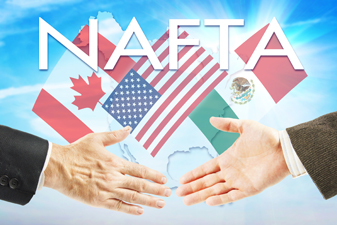|
By Katie Cross, Associate, Blakey & Agnew
In late February, Secretary of State Rex Tillerson and Secretary of Homeland Security John Kelly paid a visit to our neighbor to the south. The two top administration officials were meant to discuss border security and trade with top officials from the Mexican administration as well as President Peña Nieto. Key members of the Canadian government, including Prime Minister Justin Trudeau and Minister of Foreign Affairs Chrystia Freeland, visited President Trump earlier in February to discuss similar topics. Swirling around both of these meetings, as well as the North American relationship in general, was the unknown future of the North American Free Trade Agreement (NAFTA).
Negotiated under President George H.W. Bush and implemented under President Bill Clinton, NAFTA is a trilateral trade agreement between Canada, Mexico and the United States that eliminated almost all tariffs on products traded between the North American countries. The deal was signed into law in 1994 and resulted in $1.1 trillion in overall trade between the partners in 2016. NAFTA has had both champions and critics on both sides of the aisle but present day dialogue seems to indicate the treaty is officially at a crossroads.
Then-candidate Donald Trump did not shy away from criticizing NAFTA during his 2016 campaign and has not backed down from this stance since taking office. The President continues to promise to either renegotiate the pact or, should negotiations not go the way the United States wants them to, withdraw from it entirely. The administration has yet to release a wish list of what a renegotiation would look like, instead Secretary of Commerce Ross told the Senate during his confirmation hearing in January that all parts of the trilateral agreement will be on the table. Still, given the signals the administration is sending and public statements from key officials, it seems likely that any renegotiation will, at the very least, address tariffs, rules of origin, and labor and environmental standards.
After President Trump told the press the U.S. would only "tweak" trade with Canada while completing an overhaul of trade with Mexico, the two countries together called for any future deal to continue to be trilateral. Separately, the Canadian government has
|

signaled that it would like any negotiations to address rules of origin as well as the NAFTA's independent dispute mechanism panels, among other topics. Mexican officials, on the other hand, have been more defensive and openly said that if any tariffs are proposed during the talks, the nation will walk away from the negotiating table all together.
Democrats on the Hill are signaling they would be willing to work with the President on a new NAFTA. On February 16, Congressman Peter DeFazio (D-OR), as well as 14 cosponsors representing districts across the country, introduced the "Blueprint for America's New Trade Policy." The resolution lays out the key areas that should be addressed in any renegotiation or new treaty, including labor and environmental standards, currency manipulation rules, and strong rules of origin. It also aims to rid NAFTA of the cross-border trucking provision requiring all three countries' highways be open and accessible to trucks from any NAFTA country. The resolution calls for the President to initiate renegotiation proceedings no later than June 1, 2017 and also asks he consider withdrawing from NAFTA should negotiations not be completed within one year.
Meanwhile, many industry stakeholders, including agricultural groups, automotive groups, and the U.S. Chamber of Commerce, have weighed in on the potential negotiations. Citing the benefits to U.S. jobs and commerce as well as the highly integrated North American supply chain, the various groups have urged the Trump administration to focus on renegotiating the deal rather than throwing it out entirely.
Blakey & Agnew, LLC is a public affairs and
communications consulting firm based in
Washington, DC.
|




